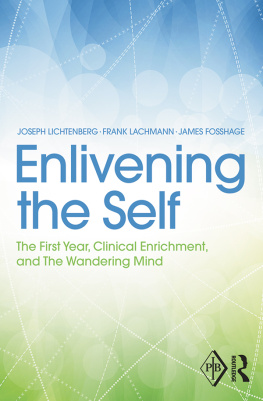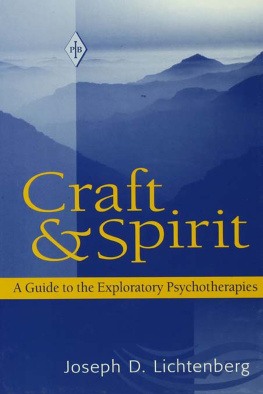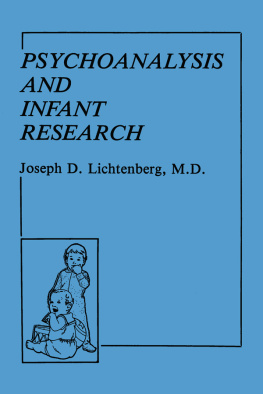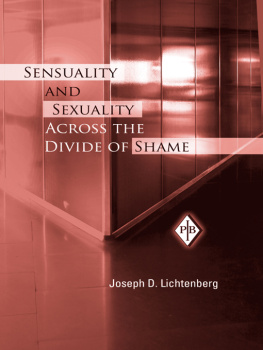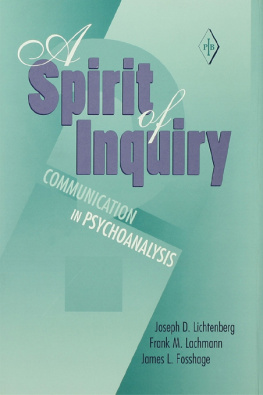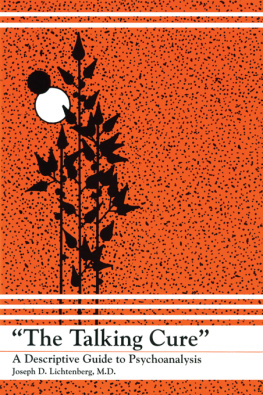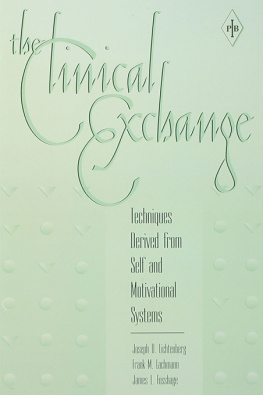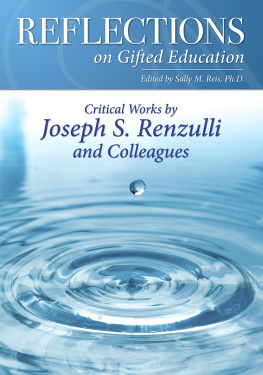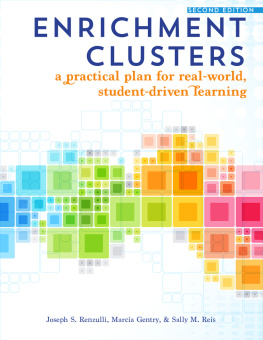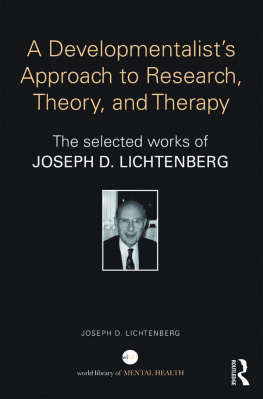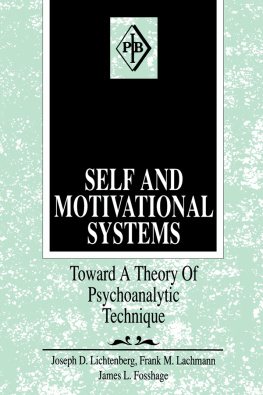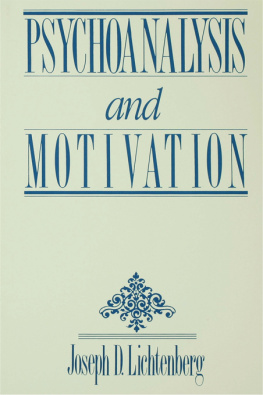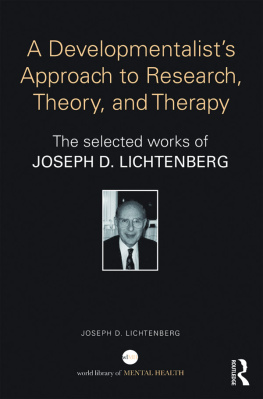In this, their fourth co-authored book, the amazing trio of Lichtenberg, Lach-mann, and Fosshage has creatively expanded and deepened their own already impressive contributions to the study of self-experience, exploring the process of, as they term it here, Enlivening the Self . Two modes of experience are scrutinized in order to conceptualise how an enlivened sense of self develops, both in infancy and then throughout life. The first mode concerns the authors more familiar territory, the individuals experience of self when he or she is attending to a specific motivational task. But even here, within their more well-travelled realm of motivational systems, the authors have something very new to offer, the elaboration of twelve research and observation-based qualities or capacities that emerge during the first year of life and that potentially serve as life-long sources of enlivenment. These twelve qualities are explored in the first essay of the volume, focused on infancy, and also in the second essay, demonstrating their clinical usefulness in the adult through two well elaborated case examples. The third essay is focussed in entirely new and original territory: the individuals sense of self when he or she is not focussed on a task, when his or her mind wanders, exploring, in this, their initial foray on the topic, how such mind wandering enlivens the self. The concept of mind wandering, as is always the case with these authors, is based in explorative research and clinical observation, and brings to our awareness an exciting and novel perspective on self-development. This is a wonderful book. I can only recommend that you see for yourself.
Estelle Shane , Ph.D. is a Training and Supervising Analyst at the Institute of Contemporary Psychoanalysis in Los Angeles and a Training and Supervising Analyst at the New Center for Psychoanalysis in Los Angeles.
Enlivening the Self
In psychoanalysis, enlivenment is seen as residing in a sense of self, and this sense of self is drawn from and shaped by lived experience. Enlivening the Self: The First Year, Clinical Enrichment, and the Wandering Mind describes the vitalizing and enrichment of self-experience throughout the life cycle and shows how active experience draws on many fundamental functional capacities, and these capacities come together in support of systems of motivation; that is, organized dynamic grouping of affects, intentions, and goals. The book is divided into three essays:
Infancy Joseph D. Lichtenberg presents extensive reviews of observation and research on the first year of life. Based on these reviews, he delineates twelve foundational qualities and capacities of the self as a doer doing, initiating and responding, activating and taking in.
Exploratory therapy James L. Fosshage looks where therapeutic change is entwined with development. There are many sources illustrated for enhancing the sense of self, and Frank M. Lachmann pays particular attention to humor and to the role that the twelve qualities and capacities play in the therapeutic process.
The wandering mind Frank M. Lachmann covers the neuroscience and observation that mind wandering is related to the immediacy of the sense of self linking now with past and future.
Throughout the book the authors arguments are illustrated with rich clinical vignettes and suggestions for clinical practice. This title will be a must for psychoanalysts, including trainees in psychoanalysis, psychiatry residents and candidates at psychoanalytic institutes and also graduate students in clinical and counselling psychology programs.
Joseph D. Lichtenberg, MD, is Editor-in-Chief of Psychoanalytic Inquiry, Director Emeritus of the Institute of Contemporary Psychotherapy and Psychoanalysis, past President of the International Council for Psychoanalytic Self Psychology, and a member of the Program Committee of the American Psychoanalytic Association.
Frank M. Lachmann, PhD, is a founding faculty member of the Institute for the Psychoanalytic Study of Subjectivity, Honorary Member, Vienna Circle for Self Psychology, The William A. White Institute, and the American Psychoanalytic Association, and Clinical Assistant Professor at the NYU Postdoctoral Program in Psychotherapy and Psychoanalysis.
James L. Fosshage, PhD, is Founding President, International Association for Psychoanalytic Self Psychology (IAPSP); Co-Founder, Board Director and Faculty, National Institute for the Psychotherapies; Founding Faculty, Institute for the Psychoanalytic Study of Subjectivity; Clinical Professor of Psychology, New York University Postdoctoral Program in Psychotherapy and Psychoanalysis. (His website is www.jamesfosshage.net.)
PSYCHOANALYTIC INQUIRY BOOK SERIES
JOSEPH D. LICHTENBERG
SERIES EDITOR
Like its counterpart, Psychoanalytic Inquiry: A Topical Journal for Mental Health Professionals, the Psychoanalytic Inquiry Book Series presents a diversity of subjects within a diversity of approaches to those subjects. Under the editorship of Joseph Lichtenberg, in collaboration with Melvin Bornstein and the editorial board of Psychoanalytic Inquiry, the volumes in this series strike a balance between research, theory, and clinical application. We are honored to have published the works of various innovators in psychoanalysis, such as Frank Lachmann, James Fosshage, Robert Stolorow, Donna Orange, Louis Sander, Lon Wurmser, James Grotstein, Joseph Jones, Doris Brothers, Fredric Busch, and Joseph Lichtenberg, among others.
The series includes books and monographs on mainline psychoanalytic topics, such as sexuality, narcissism, trauma, homosexuality, jealousy, envy, and varied aspects of analytic process and technique. In our efforts to broaden the field of analytic interest, the series has incorporated and embraced innovative discoveries in infant research, self psychology, intersubjectivity, motivational systems, affects as process, responses to cancer, borderline states, contextualism, postmodernism, attachment research and theory, medication, and mentalization. As further investigations in psychoanalysis come to fruition, we seek to present them in readable, easily comprehensible writing.
After 25 years, the core vision of this series remains the investigation, analysis, and discussion of developments on the cutting edge of the psychoanalytic field, inspired by a boundless spirit of inquiry.
PSYCHOANALYTIC INQUIRY BOOK SERIES
JOSEPH D. LICHTENBERG
SERIES EDITOR
Vol. 2
Psychoanalysis and Infant Research
Joseph D. Lichtenberg
Vol. 8
Psychoanalytic Treatment: An Intersubjective Approach
Robert D. Stolorow, Bernard Brandchaft, & George E. Atwood
Vol. 10
Psychoanalysis and Motivation
Joseph D. Lichtenberg
Vol. 12
Contexts of Being: The Intersubjective Foundations of Psychological Life
Robert D. Stolorow & George E. Atwood
Vol. 13
Self and Motivational Systems: Toward a Theory of Psychoanalytic Technique
Joseph D. Lichtenberg, Frank M. Lachmann, & James L. Fosshage
Vol. 14
Affects as Process: An Inquiry into the Centrality of Affect in Psychological Life
Joseph M. Jones
Vol. 16
The Clinical Exchange: Techniques Derived from Self and Motivational Systems
Joseph D. Lichtenberg, Frank M. Lachmann, & James L. Fosshage
Vol. 17
Working Intersubjectively: Contextualism in Psychoanalytic Practice

